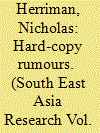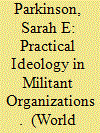| Srl | Item |
| 1 |
ID:
138500


|
|
|
|
|
| Summary/Abstract |
Many scholars have analysed media and communications in Indonesia by focusing on state control and resistance to it. Another approach emphasizes the press and society interacting. This paper analyses rumours spreading through East Java in October and November 1998, which held that ‘ninjas’ were targeting traditionalist Muslims, their leaders, preachers and the whole community. The author argues that these rumours developed through the interplay of the newspapers and local gossip.
|
|
|
|
|
|
|
|
|
|
|
|
|
|
|
|
| 2 |
ID:
179160


|
|
|
|
|
| Summary/Abstract |
Ideology shapes militant recruitment, organization, and conflict behavior. Existing research assumes doctrinal consistency, top-down socialization of adherents, and clear links between formal ideology and political action. But it has long been recognized that ideological commitments do not flow unaltered from overarching cleavages or elite narratives; they are uneven, contingent, fraught with tension, and often ambivalent. What work does ideology do in militant groups if it is not deeply studied, internalized, or sincerely believed? How can scholars explain collective commitment, affinity, and behavioral outcomes among militants who clearly associate themselves with a group, but who may not consistently (or ever) be true believers or committed ideologues? I argue that practical ideologies—sets of quotidian principles, ideas, and social heuristics that reflect relational worldviews rather than specific published political doctrines, positions, platforms, or plans—play a key role in militant socialization through everyday practices. Ethnographic evidence gained from fieldwork among Palestinians in Lebanon demonstrates how militants and affiliates render ideas about ideological closeness and distance accessible through emotional, intellectual, and moral appeals. This approach reaffirms the role of discourse and narrative in creating informal mechanisms of militant socialization without expressly invoking formal doctrine.
|
|
|
|
|
|
|
|
|
|
|
|
|
|
|
|